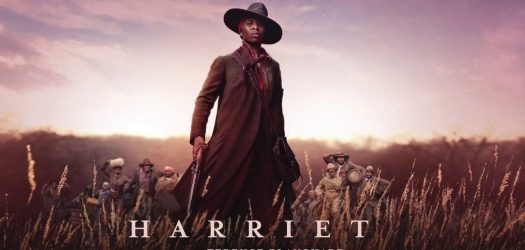About Harriett ... and the Negro Hollywood Road Show
By Rabiah Muhammad, Guest Columnist | Last updated: Dec 4, 2019 - 12:09:22 PMWhat's your opinion on this article?
The dramatized biopic Harriet was released on November 1, 2019, unleashing a torrent of cancel culture commentary on social media. Three days later, Floyd Webb, Chicago’s filmophile extraordinaire coined the term “the bi-annual Upset Negro Roadshow Complaining about Hollywood” in his review of the movie.

|
Although I didn’t totally agree with his review, I respected his opinion. I remember him as the founder and producer of the Blacklight Film Festival, the first Black film festival I ever attended.
What struck me about Floyd’s comment was its absolute truth. Every so often, the trolls among us bang the drum against a Black film. Most egregious of all to me was the attack on Birth of a Nation, directed by Nate Parker and released in 2016.
The release of Harriet was no different. Social media, and even a few noted print publications abounded with complaints. The major criticism seemed to be the casting of Cynthia Erivo, a Tony (musical award) winning actress, born in London to Nigerian parents. Wait a minute. Ain’t she a Black woman? She won her Tony for The Color Purple. Were we mad about that? As for her being a speaker of anti-Black rhetoric, it’s my understanding those words were spoken years ago. Enter the Nate Parker accusatory pattern.
And, while critics were quick to make two negative and erroneous points, focusing on the portrayal of a brutal Black slavecatcher as main villain and Harriet’s master as savior, I failed to see any mention of the opening scene when Vondie Hall Curtis, the preacher, quotes Colos-sians 3:22, “Slaves honor your earthly masters” marking a clear example of how the Bible was used to subjugate our people. And how at night, he was hiding and helping slaves escape to freedom. What about the Fruit of Islam-like navy of Black men who worked the waters and assisted conductors on the Underground Railroad?
But this rant is not really about social media trolls and their inaccurate and strangely biased anti-Harriet self-reviews. I want to expand upon Mr. Webb’s point with which I agree: What have we done for the Black film industry? How many of us have contributed to a film maker? Or is we only good for joining the upset Negro bandwagon. Well, I for one, stand in favor of Harriet ... though not perfect and perhaps a tad too long. In the interest of transparency, I don’t go to Hollywood productions to be educated about my history. That’s what educational institutions are for. (Insert shameless plug for controlling, providing the education for our children.)
As a film, Harriet stands high among the Academy Award standards for writing, direction, acting, cinematography and music. I raise the Academy ‘cause that will be the next episode of the roadshow—will the film or Erivo be nominated? Like I say every year: Where’s our Academy Awards? The Oscars are awarded based on nominations by craft—actors vote for actors, directors for directors, etc. We certainly have enough Black people working before and behind the camera to produce such an event. In fact, the American Black Film Festival, founded by Robert Townsend and Will Packer, has staged an award show at each year’s convention. Sometimes it’s televised but without a huge publicity roll-out or coverage by a major media outlet. Which brings us to my next point: What are we doing about film distribution? ‘Cause distribution deals impact income for producers, directors, and sometimes even the cast. It generates ticket sales which become profit—or not.
Here’s how distribution fits in. Black Panther distributed by behemoth Walt Disney opened in 4,020 theaters raking in an average per theater take of $18,890 a day. Harriet on the other hand, distributed by Focus Features, opened in almost exactly half the number, 2,059 theaters, with an average daily take per theater of a measly $1,891 a day. Although I believe the negative word of mouth about Harriett will not sustain itself, the impact of a smear campaign is starkly imprinted with the demise of Birth of a Nation. Released in 2,105 theaters on opening day, it raked in about $1,200 per theater per day. But only three days later, the per theater average number had dropped to $812. Three days being the span of the media hype about Parker’s #MeToo troubles, in which he was accused of sexual misconduct in college. The film was removed from release after only 90 days. Black Panther remained in circulation for 45 weeks. (All film stats were retrieved from https://www.boxofficemojo.com/ which compiles daily box office stats for domestic, foreign, and worldwide receipts.)
The sad reality is we can’t get our films distributed widely. We ain’t got 2,000 Black-owned movie theaters. Do we even have 100? That’s why it’s so difficult to see independent Black films, the ones that become universally adored by us. Think about Daughters of the Dust. So, if you have one Black-owned theater in your city, support it. Let’s pool our resources and build, buy some more. Let’s collaborate on a Black-owned distribution network. And, let’s get off the roadshow.
Rabiah Muhammad, Ph.D., is a Chicago-based writer and educator.
INSIDE STORIES AND REVIEWS
-
-
About Harriett ... and the Negro Hollywood Road Show
By Rabiah Muhammad, Guest Columnist » Full Story -
Skepticism greets Jay-Z, NFL talk of inspiring change
By Bryan 18X Crawford and Richard B. Muhammad The Final Call Newspaper @TheFinalCall » Full Story -
The painful problem of Black girls and suicide
By Charlene Muhammad -National Correspondent- » Full Story -
Exploitation of Innocence - Report: Perceptions, policies hurting Black girls
By Charlene Muhammad -National Correspondent- » Full Story -
Big Ballin: Big ideas fuel a father’s Big Baller Brand and brash business sense
By Bryan Crawford -Contributing Writer- » Full Story






 Click Here Stay Connected!
Click Here Stay Connected!








